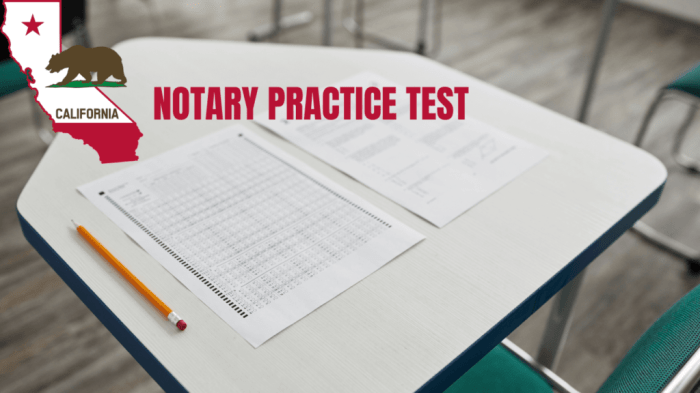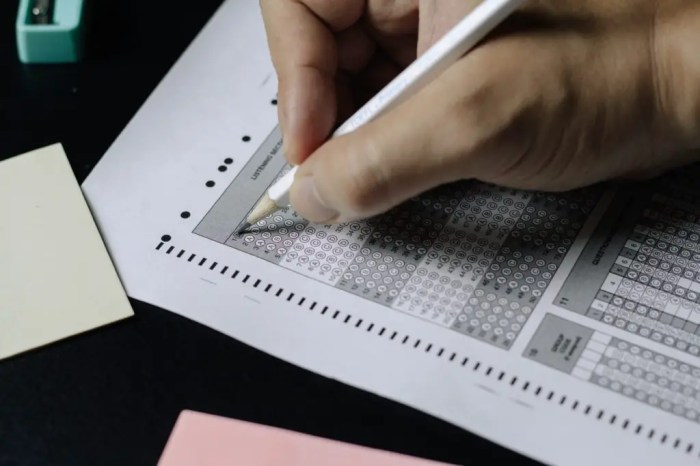Embark on a journey to notary success with our comprehensive notary exam practice test CA. This guide unveils the secrets of the California Notary Exam, empowering you to conquer the test with ease. Dive into the intricacies of notary laws, ethics, procedures, and recordkeeping, and emerge as a notary public ready to serve with excellence.
As you navigate this practice test, you’ll encounter a treasure trove of knowledge and insights. Master the art of identifying and verifying signers, witnessing signatures, and maintaining meticulous notary records. With our expert guidance, you’ll be equipped to handle any notarization task with precision and confidence.
Notary Exam Overview

The California Notary Exam is a requirement for becoming a notary public in the state of California. To be eligible to take the exam, you must be at least 18 years old, a legal resident of California, and have not been convicted of a felony or certain misdemeanors.The
exam is administered by the California Secretary of State and consists of two parts: a written exam and a practical exam. The written exam covers topics such as notary law, ethics, and procedures. The practical exam tests your ability to perform notarial acts, such as witnessing signatures and administering oaths.To
pass the exam, you must score at least 70% on both the written and practical exams. If you fail either part of the exam, you will need to retake that part.
If you’re preparing for the notary exam in California, practice tests can be invaluable. But don’t forget to brush up on your literary knowledge too. Check out this quiz on Act 1 of The Crucible to test your understanding of the play’s themes and characters.
Then, get back to your notary exam practice test ca and ace it!
Practice Test Materials: Notary Exam Practice Test Ca

The California Notary Exam Practice Test is a valuable resource for aspiring notaries to assess their knowledge and identify areas for improvement. This comprehensive test covers all essential topics tested on the actual exam, providing candidates with a realistic simulation of the testing experience.
paragraphThe practice test includes a diverse range of questions designed to evaluate candidates’ understanding of notary laws, ethical principles, procedures, and recordkeeping requirements. By completing the practice test, candidates can gain confidence in their abilities, identify weaknesses, and develop effective study strategies to enhance their preparation for the official exam.
Notary Laws
- Covers fundamental notary laws governing the powers, duties, and responsibilities of notaries public in California.
- Examines legal requirements for becoming a notary, including qualifications, application process, and oath of office.
- Explores the scope of notary authority, including types of notarial acts, limitations, and prohibited activities.
Notary Ethics
- Emphasizes the ethical principles that guide notaries in their professional conduct.
- Discusses the importance of impartiality, confidentiality, and avoidance of conflicts of interest.
- Examines the consequences of ethical violations and the responsibilities of notaries to report misconduct.
Notary Procedures
- Provides detailed guidance on proper notary procedures, including identification verification, witnessing signatures, and administering oaths.
- Covers the use of notary journals, recordkeeping requirements, and the importance of maintaining accurate and complete records.
- Examines the steps involved in notarizing various types of documents, such as deeds, contracts, and affidavits.
Notary Recordkeeping, Notary exam practice test ca
- Highlights the legal obligation of notaries to maintain detailed and organized records of their notarial acts.
- Explains the specific requirements for recordkeeping, including the types of information to be recorded and the duration of record retention.
- Examines the importance of recordkeeping for legal compliance, accountability, and protection against liability.
Exam Preparation Strategies

Passing the California Notary Exam requires a solid preparation strategy. Effective study methods include:
- Active Reading:Read the Notary Public Handbook thoroughly, highlighting key concepts and taking notes.
- Flashcards:Create flashcards with important terms, definitions, and legal requirements.
- Spaced Repetition:Review your notes and flashcards at increasing intervals to strengthen memory.
- Practice Questions:Solve sample exam questions to familiarize yourself with the exam format and identify areas needing improvement.
- Mock Exams:Take full-length practice exams under timed conditions to simulate the actual exam experience.
Memorization Techniques
To memorize key concepts effectively, try:
- Chunking:Break down large amounts of information into smaller, manageable chunks.
- Mnemonic Devices:Use acronyms, rhymes, or stories to make information easier to recall.
- Visualization:Create mental images or diagrams to connect concepts and enhance understanding.
- Active Recall:Test yourself regularly by trying to recall information without looking at your notes.
Practice Exam Questions
Practicing exam-style questions is crucial for success. Here are some tips:
- Time Management:Time yourself while solving practice questions to improve your pacing.
- Critical Reading:Carefully read the questions and instructions to avoid misinterpretations.
- Elimination:Eliminate obviously incorrect answers to narrow down your choices.
- Guessing:If unsure, make an educated guess rather than leaving questions unanswered.
- Review and Analyze:After completing practice exams, review your answers and identify areas for improvement.
Notary Laws and Ethics
Notaries public in California are bound by a strict set of laws and ethical obligations. These laws and ethical guidelines ensure that notaries perform their duties with integrity, impartiality, and accuracy.
The California Secretary of State’s office is responsible for regulating notaries public in the state. Notaries must comply with all applicable laws and regulations, including the California Civil Code and the California Government Code.
Legal Responsibilities of Notaries Public
- Notaries must be impartial and unbiased when performing their duties.
- Notaries must not perform any act that could be construed as practicing law.
- Notaries must not provide legal advice.
- Notaries must keep a journal of all notarial acts performed.
- Notaries must maintain the confidentiality of all information obtained in the course of their duties.
Ethical Obligations of Notaries Public
- Notaries must act with integrity and honesty.
- Notaries must avoid conflicts of interest.
- Notaries must be professional and courteous.
- Notaries must respect the privacy of individuals.
- Notaries must comply with all applicable laws and regulations.
Common Pitfalls and Ethical Dilemmas
Notaries public may encounter a variety of pitfalls and ethical dilemmas in the course of their duties. Some common pitfalls include:
- Failing to properly identify the signers of a document.
- Notarizing a document that is not properly executed.
- Notarizing a document that is fraudulent or forged.
Some common ethical dilemmas include:
- Being asked to notarize a document that you have a conflict of interest in.
- Being asked to notarize a document that you believe is fraudulent or forged.
- Being asked to provide legal advice.
If a notary public encounters a pitfall or ethical dilemma, they should seek guidance from the California Secretary of State’s office or from an experienced notary public.
Notarization Procedures
Notarization is the process of witnessing and verifying the signing of a document and attesting to the signer’s identity and the authenticity of their signature. Proper notarization procedures are crucial to ensure the validity and legal recognition of notarized documents.
Here are the detailed procedures for notarizing various types of documents:
Identification and Verification of Signers
Before notarizing a document, the notary must identify and verify the identity of the signer. This can be done by:
- Examining an official photo ID (e.g., driver’s license, passport)
- Verifying the signer’s signature against a previous signature on file
- Having the signer sign in the notary’s presence
Witnessing Signatures
Once the signer’s identity has been verified, the notary must witness the signer signing the document. This involves:
- Observing the signer sign the document
- Noting the date and time of signing
- Having the signer acknowledge that they understand the contents of the document and are signing it willingly
Maintaining Notary Records
Notaries are required to maintain a journal or other record of all notarial acts performed. This record should include:
- The date and time of the notarization
- The name and address of the signer
- The type of document notarized
- The notary’s signature and seal
Recordkeeping and Documentation

Maintaining accurate notary records and documentation is crucial for notaries public. These records serve as proof of notarial acts and protect notaries from legal liability.
Notaries must keep a journal or other record that contains the following information for each notarial act performed:
- The date and time of the notarial act
- The type of notarial act performed (e.g., acknowledgment, jurat, protest)
- The name and address of the signer
- The type of identification used by the signer
- The number and type of notarial services provided
- The fees charged for the notarial services
Notaries must also retain the original documents that were notarized for at least ten years.
Importance of Recordkeeping
Accurate recordkeeping is essential for several reasons:
- Legal Compliance:Notaries are required by law to maintain accurate records of their notarial acts.
- Liability Protection:Records provide evidence of the notarial act and can protect notaries from liability if the validity of the act is challenged.
- Audit Trail:Records allow notaries to track their notarial activities and identify any potential errors or irregularities.
- Quality Control:Records can be used to evaluate the quality of notarial services provided and identify areas for improvement.
Notary Resources
Notaries public in California have access to a wealth of resources to support their professional development and ensure compliance with state regulations. These resources include professional organizations, educational materials, and online forums.Professional organizations, such as the California Association of Notaries (CAN) and the National Notary Association (NNA), provide members with access to continuing education opportunities, networking events, and professional liability insurance.
Educational materials, including online courses, webinars, and printed materials, are available from a variety of sources, including the Secretary of State’s office and private providers. Online forums and social media groups provide notaries with a platform to connect with colleagues, ask questions, and share best practices.
Continuing Education and Professional Development
Continuing education is essential for notaries public to stay up-to-date on the latest laws and regulations governing their profession. The Secretary of State’s office offers a variety of continuing education courses, both online and in-person. Notaries can also find continuing education opportunities through professional organizations and private providers.
Question Bank
What is the passing score for the California Notary Exam?
70%
How many questions are on the California Notary Exam?
75
What topics are covered on the California Notary Exam?
Notary laws, ethics, procedures, and recordkeeping